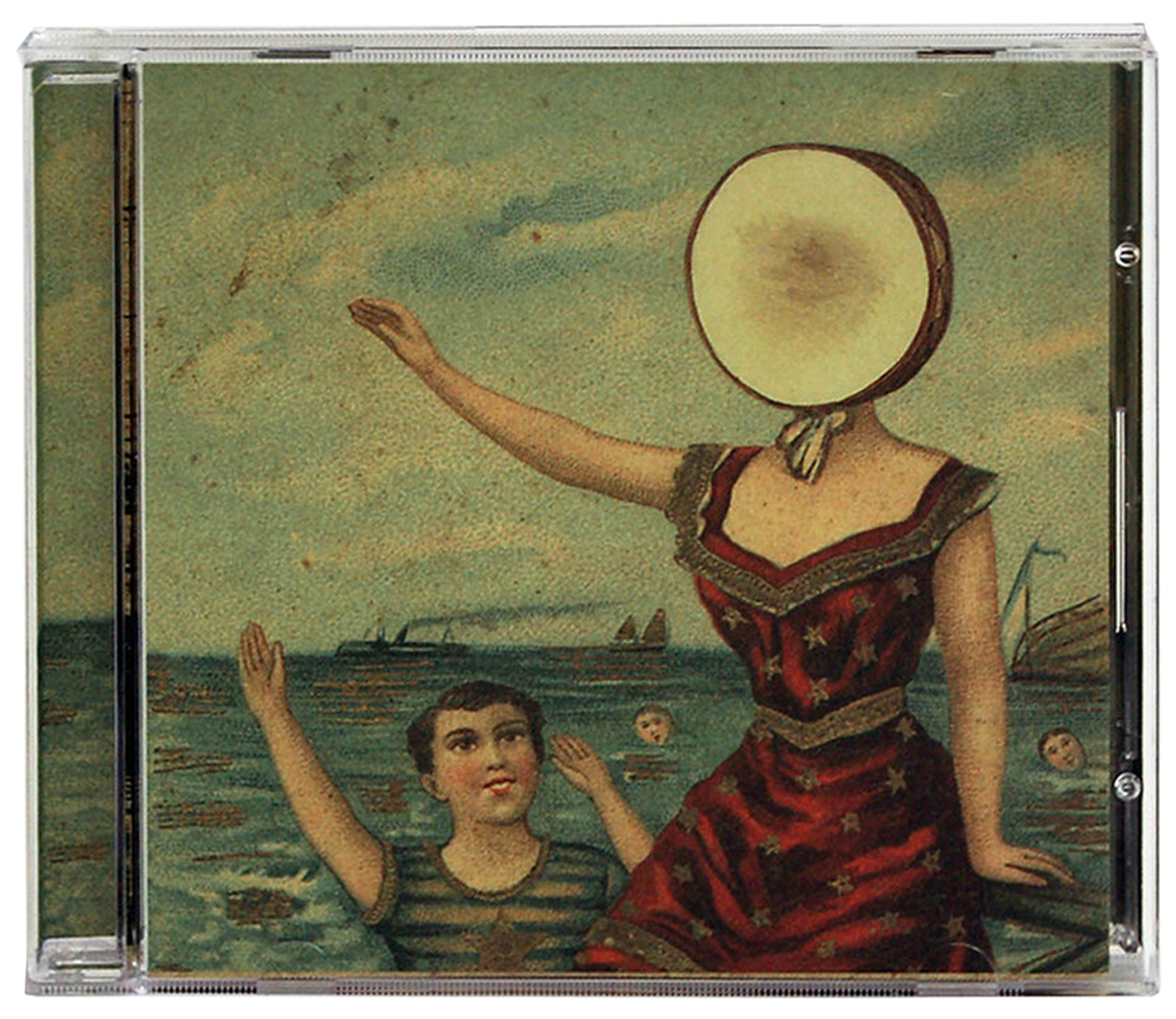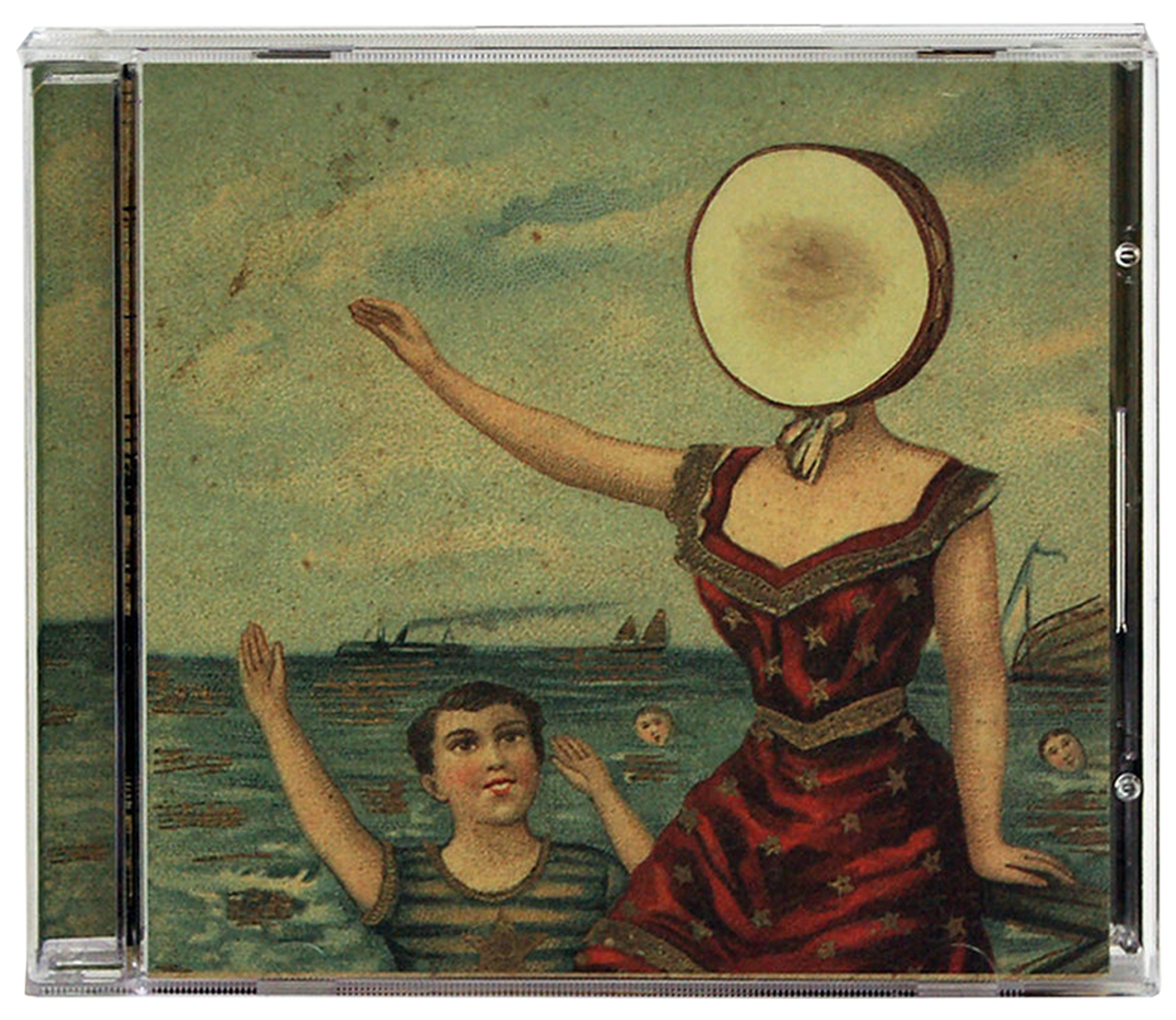The Anne Frank Album
On the 25th anniversary of Jeff Mangum’s indie rock classic ‘In the Aeroplane Over the Sea’




In 1996, prior to recording his first album, On Avery Island, the American musician Jeff Mangum, then the leader of a nascent indie rock band called Neutral Milk Hotel, picked up probably the most famous piece of non-rabbinical Jewish writing, Anne Frank’s The Diary of a Young Girl. Frank’s book, composed in Dutch and now available in 70 languages, would become the basis for In the Aeroplane Over the Sea, Neutral Milk Hotel’s second album, which is now recognized as one of the greatest achievements of 1990s indie rock. In an interview with Pitchfork magazine, Mangum recalled, “I was walking around wondering, ‘If I knew the history of the world, would everything make more sense to me or would I just lose my mind?’ And I came to the conclusion that I’d probably just lose my mind. The next day I went into a bookstore and walked to the wall in the back, and there was The Diary of Anne Frank. I’d never given it any thought in my entire life. I spent two days reading it and then completely flipped out.”
I read The Diary of Anne Frank as a school assignment last year. I knew the story, I had been taught about it for years. I thought the diary itself was mildly upsetting. It was long, in difficult language and pretty dry in some entries. Reading the diary seemed like work that I could not, and did not enjoy. But somehow Jeff Mangum found something much deeper in the book. In the same interview, Mangum states, “And so here I am as deep as you can go in someone’s head, in some ways deeper than you can go with even someone you know in the flesh. And then at the end, she gets disposed of like a piece of trash. And that was something that completely blew my mind.”
Mangum, the lead singer and genius of Neutral Milk Hotel and a founder of the Elephant 6 recording collective, was born in Ruston, Louisiana. He met his future bandmates Robert Schneider, Bill Doss, and Will Cullen Hart in middle school, where they bonded over their shared love of psychedelic music. In high school, the four started to produce tapes, most notably Cranberry Lifecycle. These tapes were mostly unlistenable, containing random bits of noise and messages left on their answering machines. After high school, Schneider started Apples in Stereo while Doss, Hart, and Mangum started The Olivia Tremor Control. Mangum then moved on to independently start Milk, which morphed into Neutral Milk, and finally into Neutral Milk Hotel.
In 1993, Mangum moved to Seattle to release the four-track EP Everything Is. Produced by Fire Records, the EP includes songs like “Aunt Eggma Blowtorch,” a sound collage which—in my opinion—is expertly put together and definitely worth a listen, preferably in the dark without any distractions. Mangum then moved again, this time to Denver, to record his debut album, On Avery Island, with Robert Schneider. I would rate this album an A-minus in the Robert Christgau grading system, which rates albums using letter grades. The standout tracks include “Gardenhead/Leave Me Alone,” “Song Against Sex,” and “Baby to Pree.” After releasing this album, Mangum went on tour with Julian Koster, Jeremy Barnes, and Scott Spillane, who eventually became the backing band for In the Aeroplane Over the Sea—Mangum’s second, final and most profound album.
In the Aeroplane Over the Sea was released 25 years ago today, on Feb. 10, 1998. In learning about the history of the album, I decided to try to find instances where Mangum describes Anne Frank and her story, to see if I could understand both my favorite band’s reclusive frontman and the diary better.
The first track, “King of Carrot Flowers Pt. 1,” is a whimsical acoustic guitar song about young love. Some speculate that this song is about Jeff Mangum wanting to be in a romantic relationship with Anne Frank—an odd yet plausible interpretation, given Mangum’s weird and sometimes vulgar song lyrics. He seems to be describing how close he feels to the girl in the song, almost like he knows her.
The next song, titled “King Of Carrot Flowers Pts. 2&3,” is a continuation of the previous track. It starts off with Mangum proclaiming “I love you, Jesus Christ / Jesus Christ, / I love you, yes I do / I love you, Jesus Christ / Jesus Christ, I love you, yes I do.” In the same Pitchfork interview, he explains, “The thing about me singing about Christ; I’m not saying ‘I love you Christianity.’ I’m not saying ‘I love all the fucked-up terrible shit that people have done in the name of God.’ And I’m not preaching belief in Christ. It’s just an expression. I’m just expressing something I might not even understand. It’s a song of confusion, it’s a song of hope, it’s a song that says this whole world is a big dream—and who knows what’s gonna happen.”
From Anne Frank and the Holocaust to Jesus Christ, Mangum certainly had a taste for big-picture imagery that is incredibly charged yet at the same time could mean anything. From the age of 11 to 17, Mangum went to, as he described them, “crazy church camps,” which seemed to have been mildly traumatizing. Is Anne Frank a secular/Jewish version of Jesus Christ for Mangum? Maybe.
The sixth track, “Holland, 1945,” is unmistakably about Anne Frank (although fans speculate about “King of Carrot Flowers,” the identity of the girl in that song is ambiguous). The first verse is as follows, “The only girl I’ve ever loved / Was born with roses in her eyes / But then they buried her alive / One evening 1945 / With just her sister at her side / And only weeks before the guns / All came and rained on everyone.” The lyrics are referring to Anne’s and her sister’s deaths in 1945, and the end of WWII, which didn’t come soon enough to save the Franks. The best lyrical sequence of this song is at the end, when Mangum sings about antisemitism, “And it’s so sad to see the world agree / That they’d rather see their faces filled with flies / All when I’d want to keep white roses in their eyes.” When he refers to Anne as having “roses in her eyes” I interpret this as a reference to how Frank saw the beauty in everything; white roses were also a symbol of opposition to Nazi Germany.
The eighth track on the album, “Oh Comely,” is the single best song that NMH has ever released—an eight-minute song that is filled with meaning and emotion and beautiful sprawling vocals that sort of sound like a mountain goat could be singing. This song also has some pretty obvious allusions to Anne Frank, such as, “I know they buried her body with others her / Sister and mother and 500 families / And will she remember me 50 years later / I wished I could save her in some sort of time machine.” This song is about the protagonist trying to find his place in the world, and looking for people who understand his struggles. The ninth track, “Ghost,” refers to Anne Frank being born.
So is Aeroplane an indie rock album about Anne Frank and the Holocaust? Only in part. Really, it’s an album about spirituality and the idea of God, which is interesting for a couple different reasons—one being that indie rock is not normally seen as a spiritual genre, another being that the lyrics are pretty racy, which is not what you would expect from an album about God, or one about Anne Frank. I think what Mangum is trying to tell us is that everybody has their own version of what God is. He decided to write about his own idea of God, which even as a Christian he represents through Anne Frank and her story. Which is sort of a radical idea.
Like Jeff Mangum, most of my own spirituality and beliefs come from music, whether it be worshiping my favorite rock stars or imagining that there’s somebody out there I can relate to. When I listened to this album, I encountered ideas that I’d had living in my head but had never told anybody about, like how life feels like some kind of twisted dream. It forced me to look at those ideas and pay attention to them. It told me that other people are weird, and live in their heads all the time in the same way I do.
For Mangum, the experience of sharing his weird personal ideas with the world was scary and strange. The album got circulated online and people started making fun of his songs, writing parodies and creating memes. Which is probably why the band has not toured for eight years and won’t for the “foreseeable future,” as it says on their website.
In a strange way, Mangum’s story has in fact come to parallel the story of the Holocaust diarist who helped inspire his greatest album. Anne Frank was forced into hiding to keep her safe from the dangers of the outside world. She hated what the world was doing, and it seemed, understandably, to drive her crazy. Mangum is a notorious recluse. Like Anne Frank, he seems to be in hiding from a world he perceives to be hostile and dangerous. He tried to distance himself from the world because his contributions were not being received in the way he intended them to be.
Interestingly, analyzing Mangum’s use of the character of Anne Frank in this album didn’t make me like the diary any more than I did before, aside from it being a book that inspired an album that I love. But it did help me understand why Mangum could find so much meaning in a book that left me cold.
Ever since I can remember, I have been told about the reality of antisemitism. I go to a private Jewish day school in which, as you can imagine, we talk about antisemitism all the time. Even though I don’t recall the Holocaust being a topic of discussion at home, it has been a major part of our school curriculum since I was young. I would say that I know more about the Holocaust than any other incident in Jewish history, or American history. I am so used to the idea of Jews being thrown out like trash that I didn’t bat an eye at Anne Frank’s horrific story.
By contrast, the reaction that Jeff Mangum had when he picked up his paperback copy of The Diary of a Young Girl was the reaction that we should all be having. The idea of a young girl and her family forced to hide from the world in an attic was so profoundly upsetting that he wrote a whole album about it. Thinking about Aeroplane, I feel deeply upset that I never got to have the kind of connection to Anne Frank’s story that Jeff Mangum did, and I will never be able to. The mistreatment of Jews just seems like a part of life that I am prepared for.
Still, I want Jeff Mangum to know how much I value this album. Thank you for creating this wonderful work of art, and happy 25th anniversary to In the Aeroplane Over the Sea.
Correction: A previous version of this article incorrectly stated that Neutral Milk Hotel did not go on tour for In the Aeroplane Over the Sea.
Susannah Samuels is a music fan and student at a Jewish day school in Brooklyn.